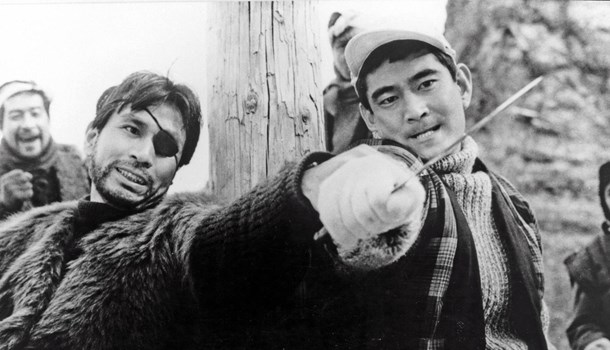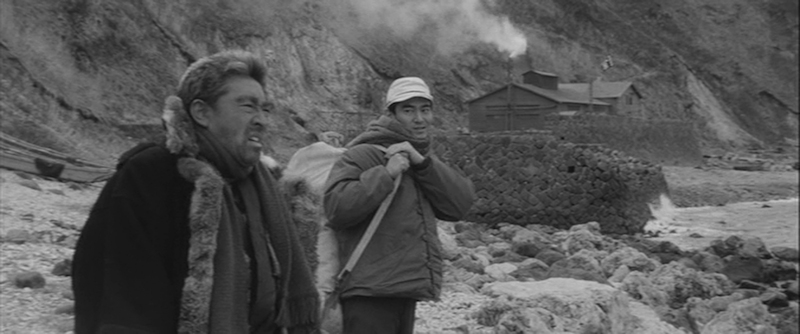
Written by Richard Durrance on 07 Nov 2025
Distributor 88 Films • Certificate 12 • Price £16.99
Time to return to Japanarchy and the 88 Films release of Jakoman and Tetsu, one of the ever burgeoning series of films, across multiple distributors, providing a wider and wider glimpse into the work of Kinji Fukasaku.
Hokkaido. 1947. Kyubei (Isao Yamagata) is hiring herring fisherman, not caring who they are or where they come from, as long as the herring come and they catch them. Enter the brooding Jakoman, (Tetsuro Tamba) whose boat Kyubei stole, leaving him to the Russians towards the end of the war. His presence, hanging over the fishery like a pall, finds Jakoman himself facing off against Tetsu (Ken Takakura), Kyubei’s son, thought dead but returned to life and his home.
The original Jakoman and Tetsu was made in 1949, starring Toshiro Mifine and co-scripted by a minor figure in Japanese cinema, one Akira Kurosawa. This 1964 version was a vehicle to turn Takakura into a major film star, and Fukasaku is an intriguing choice of director when you view much of his other work at the time which focus on crime and yakuza; this is a more straightforward drama but he fits into it with ease. It's immediately clear as the film unfolds that Fuaksaku is just as at home with moments of fast cutting drama as he is when allowing his camera to prowl around the interior of the fishery, where the men sleep, or outside by the sea. Tetsu, dancing to entertain those fishermen who are waiting for the right time to pull in their nets, is equally well filmed, so Fukasaku never feels like an action director in need of "Bang, Crash and Wallop", quite the opposite in fact. He seems to revel in creation of mood, this being a cheap fishery by a rough sea, something we see writ large on the face of Kyubei, which again is an image Fukasaku is willing to allow his camera to linger on.
Thematically, there is a moral greyness to both the story and the characters which align with Fukasaku’s other work. It may be true that Takakura’s Tetsu is the good guy, but his father often calls him an ungrateful son because Tetsu is as likely to take the fishermen's side against his father, or even Jakoman’s. Why? Because the truth of their past is laid bare early on in the film and so the father is definitely no paragon; often he’s worse than most, trying to cheat the fishermen out of their share because he hasn’t the money – which may be true – and there’s a self-interest to him that is also shared with his daughter. Her husband is the book-keeper and she obsesses over Tetsu returning and becoming the heir. It’s all money, very little love. That said you have to consider the setting, just after the war, with jobs and money scarce, so the reality is that this is about survival more than villainy, something that comes to the fore with the character known only as Osaka (Shinjiro Ehara) who, if anything, has committed the worst crime and paid for it, but struggled to deal with the guilt. He’s an image of what Jakoman could become.
Let’s not forget that the title of the film is Jakoman and Tetsu and there is a rivalry and a begrudging type of respect that naturally unfolds between them. Both had been left for dead but their response to living is almost the polar opposite. This is even visible in the woman, Yuki (Hizuru Takachiho), who has been chasing Jakoman for years, and is unflinching in her willingness to continue to do so, no matter his feelings – Jakoman treats her with disdain and anger; he can only see his past with the future a country that is alien to him; on the other hand Tetsu is, you suspect, sweet on a young farm girl he meets when returning to tell their family of the death of their son, with whom he sailed. How the women respond to both men and how they respond to the women is telling. And this is mainly a film about men yet Yuki has the most impactful female role in the film and her performance makes you believe she could trek through the years and miles for love, even if perhaps we cannot see what she does in Jakoman - but why should we know what she sees? She knew him in more carefree days when he was more of a carefree rogue (his boat was unlicensed) than the brooding and troubled man he has become.
So despite being part of 88 Films Japanarchy range there is little anarchy in Jakoman and Tetsu, but in many ways it’s all the better for it. We may get the odd fistfight, but instead of action Fukasaku provides us with a moody, windswept film bustling with the emotions of men (and some women) trying to find a way to live after the horrors of war. It’s a film that’s often elegantly shot, making the best use of its widescreen black and white photography. So even if you expected action, as perhaps I did, instead enjoy the characters and tone of a pleasing surprise in Kinji Fukasaku’s filmography.


Long-time anime dilettante and general lover of cinema. Obsessive re-watcher of 'stuff'. Has issues with dubs. Will go off on tangents about other things that no one else cares about but is sadly passionate about. (Also, parentheses come as standard.) Looks curiously like Jo Shishido, hamster cheeks and all.
posted by Richard Durrance on 31 Oct 2025
posted by Richard Durrance on 29 Oct 2025
posted by Richard Durrance on 23 Oct 2025
posted by Richard Durrance on 13 Oct 2025
posted by Richard Durrance on 08 Oct 2025
posted by Richard Durrance on 25 Sep 2025
posted by Richard Durrance on 16 Sep 2025
posted by Richard Durrance on 10 Sep 2025